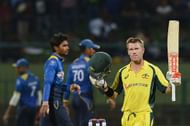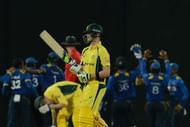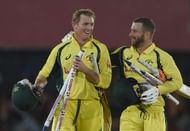The fallout that ensued
The writing was on the wall. The frailties of the Australian lineup against spin stood exposed and both Steve Smith and coach Darren Lehmann were drilled for answers they couldn’t fathom. "I’d be lying if I said I hadn’t replayed my dismissals from this series over and over in my head when I’ve been alone in my hotel room. Looking back, there are several shots that I regret playing," said Smith, after the Test whitewash.
It wasn’t just him who would have replayed those shots. Probably, the squad in its entirety was doing the same. Lehmann had anxious words to offer, “The difference is we've got to change in the subcontinent. Results will say that with India, UAE and now Sri Lanka.”
“We've got to change the way we pick and shape up the squad for a subcontinent (tour). We have to look at all different angles, I suppose. The shape-up of the side – whether you need one quick, two quicks, three quicks, all-rounders, and see how we play.”
Thankfully, the next assignment was with the white ball and in a format that brought fewer risks and greater risk taking abilities. However, for one man in the side, the time for adventurous endeavours was over, at least for the tour. After narrowly winning the first ODI and suffering at the hands of another left-arm spinner, Amila Aponso, the Australian captain felt that he'd had enough.
The decision to withdraw from the tour midway could have been a strategic one, but in popular opinion and the face of it, it only gives the feeling of backing away. The Australians might value their home season to the core, but they need their best batsman to prosper, if they are to win future tours to the subcontinent. That Smith’s withdrawal was a blessing in disguise was, yet again, foreseen by only a few.

Warner takes charge
David Warner’s Sunrisers Hyderabad had won the Indian Premier League (IPL) for the first time in 2016, and much like the team they defeated in the final – the Royal Challengers Bangalore – the captain had played a major role in their maiden title victory. Thus, when the opportunity came to lead the national side, Warner wasn’t the one to back away.
In Dilshan’s final ODI, the third of the series in Dambulla, Australia were helped by Sri Lanka’s ailment of losing too many wickets in the middle overs after a decent start by their top three. Barring Dinesh Chandimal's century and Dilshan's goodbye knock of 42, none of the Lankan batsmen could play with patience. Mitchell Starc's thunderbolts didn't help them either.
The second of the two ODIs scheduled for Dambulla – this time sans Dilshan – saw Dhananjaya de Silva scored a promising 76, but this time, neither Chandimal or the captain, Angelo Mathews could give him any sort of a support. On the other hand, Aaron Finch and George Bailey continued their rich vein of form that they had picked up since the beginning of the series and guided Australia home.
Australia had won the series and had something to show in lieu of the time and resources spent on the tour. This series victory along with the form of George Bailey, and the ODI new recruit Travis Head would be some of the positives that they can take out from the series.
Australia salvage some pride
With the 5th ODI reduced to a formality, Warner, the captain, who had led from the front but hadn't quite contributed with the bat, took the onus upon himself to rub salt on Sri Lanka's injury. Chasing only 196 to win, courtesy some fine bowling by Starc and company, Warner battled his demons against spin and worked his way to a scratchy yet effective hundred to seal the series 4-1.
The turnaround was impressive. Australia did manage to win something, after being whitewashed in the whites. But the injury still lingered. That is tour will be judged more by their performances in the Tests than the victories in the ODIs and the record-shattering spree in the T20Is is anybody’s guess. However, the man who was responsible for picking the men for the tour had a different opinion.
“Good players are good players. That’s what we’ve got to remember. They’re usually good players because they can adapt to conditions,” said Rod Marsh, the chairman of selectors. “We had a bit of a blip here. But we’re not going to panic. There’s no way. We can’t afford to panic because it’s just ridiculous if we do.”
A ridiculous performance being dismissed as a blip might not have been the best of ideas to implement, but if Marsh’s believes so, Australia would have to prove him right when they come to India in February-March 2017.
Looking for fast live cricket scores? Download CricRocket and get fast score updates, top-notch commentary in-depth match stats & much more! 🚀☄️


